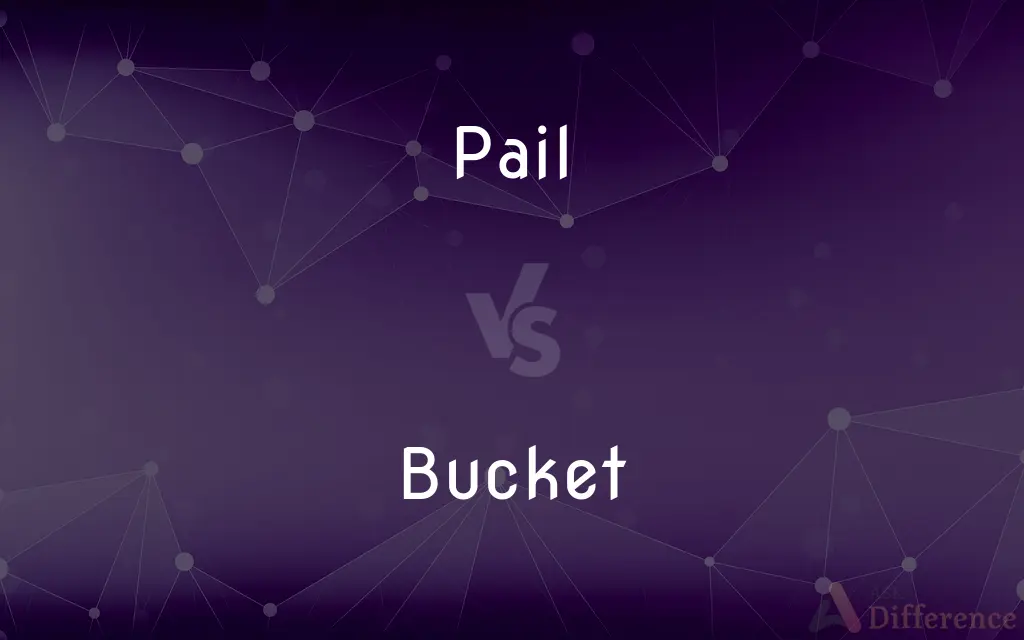Pail vs. Bucket — What's the Difference?
By Tayyaba Rehman — Updated on October 11, 2023
Pail and Bucket are often used interchangeably to refer to a cylindrical container; however, a pail typically has a top or lid, while a bucket may not.

Difference Between Pail and Bucket
Table of Contents
ADVERTISEMENT
Key Differences
Pail and Bucket are both familiar terms in the English language and primarily refer to containers used for holding or carrying liquids or other substances. A pail often indicates a smaller, more portable container, perhaps with a sealing mechanism. On the other hand, a bucket is a more general term and can encompass larger containers without the necessity of having a lid.
Both the terms Pail and Bucket have been integrated into various idiomatic expressions and colloquialisms. One might "kick the bucket" as an idiomatic way of referring to death or "drop the pail" to suggest giving up. The ubiquity of these terms demonstrates their importance in everyday language.
In terms of construction, a Pail might have certain features that make it distinct from a regular bucket. A pail could be designed with a lid or top, suggesting it's intended to keep its contents sealed or protected. A bucket might lack these features, emphasizing its role for temporary storage or transportation.
Furthermore, the material and design can differ when comparing a Pail and Bucket. Pails, especially those meant for food or drink, could be made of food-safe plastics or metals. Buckets might be constructed from heavier materials, like metal or durable plastics, especially if they're intended for industrial use.
Lastly, both Pail and Bucket have found their way into pop culture, advertising, and literature. They represent more than just containers; they can symbolize effort, aspiration, or the act of containing something, be it tangible or intangible.
ADVERTISEMENT
Comparison Chart
Size
Generally smaller.
Can be larger in size.
Lid Presence
Often comes with a lid or top.
Might not always have a lid.
Common Material
Can be made of food-safe plastics or metals.
Often made of metal or durable plastics.
Idiomatic Expressions
"Drop the pail" to suggest giving up.
"Kick the bucket" refers to death.
Usage Context
Might suggest a more specific or protective function.
More general, emphasizing temporary storage.
Compare with Definitions
Pail
A cylindrical vessel often with a lid or top.
The ice cream was stored in a metal pail.
Bucket
A cylindrical container used for holding or carrying liquids.
He carried a bucket of paint up the ladder.
Pail
A small container with a handle for carrying or holding liquids.
She filled the pail with fresh water.
Bucket
A larger vessel often without a sealing top.
The sandcastle was made using a plastic bucket.
Pail
A container specifically designed for milk or other food items.
The farmer collected milk in the pail every morning.
Bucket
A term often used in colloquial expressions or idioms.
Sadly, the old man kicked the bucket last night.
Pail
A portable vessel often used in domestic contexts.
She bought a colorful pail for her child's beach trip.
Bucket
A container made of durable materials for rough use.
The construction site was filled with metal buckets.
Pail
A term used in idioms or phrases suggesting a specific action.
When the project failed, he felt like he dropped the pail.
Bucket
A vessel used in various cultural or traditional contexts.
The ceremony involved pouring water from a decorative bucket.
Pail
A watertight cylindrical vessel, open at the top and fitted with a handle; a bucket.
Bucket
A bucket is typically a watertight, vertical cylinder or truncated cone or square, with an open top and a flat bottom, attached to a semicircular carrying handle called the bail.A bucket is usually an open-top container. In contrast, a pail can have a top or lid and is a shipping container.
Pail
The amount that a pail can hold.
Bucket
A cylindrical vessel used for holding or carrying liquids or solids; a pail.
Pail
A vessel of wood, tin, plastic, etc., usually cylindrical and having a handle -- used especially for carrying liquids, for example water or milk; a bucket (sometimes with a cover).
The milkmaid carried a pail of milk in each hand.
Bucket
The amount that a bucket can hold
One bucket of paint will be enough for the ceiling.
Pail
(In technical use) A closed (covered) cylindrical shipping container.
Bucket
A unit of dry measure in the US Customary System equal to 2 pecks (17.6 liters).
Pail
A vessel of wood or tin, etc., usually cylindrical and having a bail, - used esp. for carrying liquids, as water or milk, etc.; a bucket. It may, or may not, have a cover.
Bucket
A receptacle on various machines, such as the scoop of a power shovel or the compartments on a water wheel, used to gather and convey material.
Pail
A roughly cylindrical that is vessel open at the top
Bucket
(Basketball) A basket.
Pail
The quantity contained in a pail
Bucket
To hold, carry, or put in a bucket
Bucket up water from a well.
Bucket
To ride (a horse) long and hard.
Bucket
To move or proceed rapidly and jerkily
Bucketing over the unpaved lane.
Bucket
To make haste; hustle.
Bucket
A container made of rigid material, often with a handle, used to carry liquids or small items.
Bucket
The amount held in this container.
Bucket
A large amount of liquid.
Bucket
A great deal of anything.
Bucket
A unit of measure equal to four gallons.
Bucket
Part of a piece of machinery that resembles a bucket (container).
Bucket
An insult term used in Toronto to refer to someone who habitually uses crack cocaine.
Bucket
(slang) An old vehicle that is not in good working order.
Bucket
The basket.
Bucket
A field goal.
Bucket
(variation management) A mechanism for avoiding the allocation of targets in cases of mismanagement.
Bucket
(computing) A storage space in a hash table for every item sharing a particular key.
Bucket
A turbine blade driven by hot gas or steam.
Bucket
A bucket bag.
Bucket
The leather socket for holding the whip when driving, or for the carbine or lance when mounted.
Bucket
The pitcher in certain orchids.
Bucket
A helmet.
Bucket
(transitive) To place inside a bucket.
Bucket
(transitive) To draw or lift in, or as if in, buckets.
Bucket
To rain heavily.
Bucket
To travel very quickly.
Bucket
(transitive) To ride (a horse) hard or mercilessly.
Bucket
To criticize vehemently; to denigrate.
Bucket
To categorize (data) by splitting it into buckets, or groups of related items.
Bucket
To make, or cause to make (the recovery), with a certain hurried or unskillful forward swing of the body.
Bucket
A vessel for drawing up water from a well, or for catching, holding, or carrying water, sap, or other liquids.
The old oaken bucket, the iron-bound bucket,The moss-covered bucket, which hung in the well.
Bucket
A vessel (as a tub or scoop) for hoisting and conveying coal, ore, grain, etc.
Bucket
One of the receptacles on the rim of a water wheel into which the water rushes, causing the wheel to revolve; also, a float of a paddle wheel.
Bucket
The valved piston of a lifting pump.
Bucket
One of vanes on the rotor of a turbine.
Bucket
A bucketfull.
Bucket
To draw or lift in, or as if in, buckets; as, to bucket water.
Bucket
To pour over from a bucket; to drench.
Bucket
To ride (a horse) hard or mercilessly.
Bucket
To make, or cause to make (the recovery), with a certain hurried or unskillful forward swing of the body.
Bucket
A roughly cylindrical that is vessel open at the top
Bucket
The quantity contained in a bucket
Bucket
Put into a bucket
Bucket
Carry in a bucket
Common Curiosities
Which is generally larger, a pail or a bucket?
Buckets are often larger than pails.
Is there a major difference between a pail and a bucket?
While often used interchangeably, a pail typically has a top or lid, while a bucket may not.
Can both pails and buckets be made of plastic?
Yes, both can be made of plastic, metal, or other materials.
Are there specific tasks better suited for a pail than a bucket?
Pails might be preferred for tasks requiring a sealable container.
Can the terms have symbolic or cultural meanings?
Yes, both can symbolize effort, containment, or specific actions in various contexts.
Do other languages differentiate between pail and bucket?
Some languages might, while others use a single term for both.
Can "pail" and "bucket" be used interchangeably in all contexts?
Generally, yes, but context matters; a pail suggests a smaller or more protective container.
Are there idiomatic expressions associated with these terms?
Yes, like "kick the bucket" or "drop the pail".
Are there specific industries that prefer using "pail" over "bucket"?
Yes, industries requiring sealable containers might prefer "pail".
Is one more durable than the other?
Durability depends on material and construction, not the term used.
Is "bucket" only an American English term?
No, "bucket" is understood in many forms of English worldwide.
Is a pail always smaller than a bucket?
Not always, but pails are generally considered to be smaller.
Do all pails come with lids?
No, but they often do, especially if meant to seal contents.
Are there historical differences in the usage of pail vs. bucket?
Both terms have old origins, but their usage and meanings might have varied historically.
Which term is older, pail or bucket?
Both terms have ancient origins; the exact age is hard to determine.
Share Your Discovery

Previous Comparison
Re vs. Ref
Next Comparison
Kiss vs. PeckAuthor Spotlight
Written by
Tayyaba RehmanTayyaba Rehman is a distinguished writer, currently serving as a primary contributor to askdifference.com. As a researcher in semantics and etymology, Tayyaba's passion for the complexity of languages and their distinctions has found a perfect home on the platform. Tayyaba delves into the intricacies of language, distinguishing between commonly confused words and phrases, thereby providing clarity for readers worldwide.














































